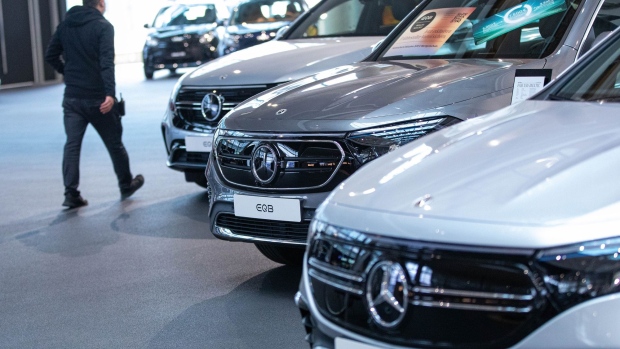Jul 27, 2022
Mercedes sees car demand continuing to outrun supply
, Bloomberg News

Mercedes-Benz AG raised its outlook, expecting more new models will keep it racing to meet demand during the rest of the year.
The automaker pointed to “solid” orders and “healthy and high-quality” demand for vehicles like the flagship electric EQS while reporting better-than-expected second-quarter earnings Wednesday. A new SUV version of the model will join the lineup later this year and help bring in more buyers.
“We see healthy demand across all main markets,” Chief Executive Officer Ola Kallenius said on a call with analysts. “Maybe it’s a result of being in the third year of artificial constraint from the semiconductor shortage.”
The world’s biggest luxury-car maker now expects group profit to be slightly higher than last year, rather than unchanged, while returns from carmaking are seen at between 12 per cent to 14 per cent, slightly higher than before.
The shares rose 2.2 per cent at 10:40 a.m. in Frankfurt trading, trimming losses so far this year to 18 per cent.
While outlining a solid few months ahead, Mercedes chimed with other major manufacturers with concerns about high inflation, supply-chain problems and a worsening energy supply crisis in Europe. Carmakers continue to battle a dearth of chips that has led to widespread production halts. Most manufacturers are seeing signs of the logjam easing, though they’re still far from assured to procure enough of the high-tech components.
At Mercedes, deliveries fell 7 per cent during the second quarter because of a lack of chips as well as other logistical challenges.
What Bloomberg Intelligence Says:
Mercedes has raised 2022 guidance following a 2Q beat -- aided by production exceeding deliveries -- with 2H set to benefit from supply constraints easing, pent-up demand and inventory rebuild, though the outlook for 2023 remains our concern on recession fears and gas rationing. Cars reported a 14 per cent 2Q Ebit margin, albeit down from 16.5 per cent in 1Q, allowing margin guidance to be raised to 12-14 per cent (from 11.5-13 per cent) with consensus already at the top end.
-- Michael Dean, BI automotive analyst
Empty dealer lots have allowed carmakers to do away with typical heavy discounts and prices for used vehicles have also ballooned. Mercedes, like other automakers, has prioritized production of their most lucrative models, a strategy that is also in line with the company’s shift to more high-end cars to rival electric leader Tesla Inc.
Mercedes also has taken further steps to keep its operations running due to the threat of gas rationing in Germany after Russia’s decision to cut supplies through a key Baltic sea pipeline have raised fears of an abrupt halt of deliveries during winter. The Sindelfingen plant, where the company makes the high-end S-Class and Maybach, can now function without natural gas, a fuel typically used in automaker’s paint operations.
“We can, in some circumstances, replace gas with oil, and also we’re looking at a bundle of efficiency measures,” Kallenius said in an interview with Bloomberg Television. “We’re preparing ourselves for some uncertainty, for scenarios, and trying to make our operations more resilient.”
Should gas become scarce, the company will be able to continue full operations with half of its usual supply if German authorities allow it to pool the fuel between plants in the country. That would entail giving the company credit for reducing gas usage at its Stuttgart plants, for example, and not ordering a cut in consumption at its Bremen factory, even though there’s no physical sharing of gas supplies among the facilities.


